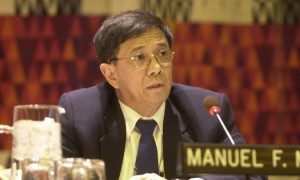
South-South Cooperation has acquired a new salience in the international development cooperation calculus. In this wide-ranging conversation with Manish Chand, Editor-in-Chief, India Writes Network, Dr Manuel Montes, Senior Advisor on Finance and Development at the Geneva-based South Centre in Geneva, outlines how South-South cooperation (SSC) enables developing countries to optimize their resources and expertise in pursuit of their national developmental goals. He also examines the importance of continuous experimentation and engagement of the private sector in achieving the core objectives of the SSC. Dr Montes compares India and China’s models of developmental cooperation, and talks about research that the South Centre has undertaken with respect to the international economy.
Q. Dr. Montes, what are the different ways of engaging in South-South Cooperation? What is the way ahead for SSC?
A. Developing countries don’t really have a lot of money right now for SSC. But SSC is more than just aid; it is the question of working together on developing projects. When developing countries operate these projects, they actually have personnel who grew through adulthood in the developing countries. So, they understand the problems that are associated with the projects, and this is the reason why there is a very big possibility of SSC being quite effective in choosing and undertaking projects, and in doing the kinds of development advances that international cooperation would usually like to afford.
Q. When we talk about the roadmap for SSC, if you take a decadal view, what are your recommendations? What are the concrete steps which can provide that an added ballast to SSC?
A. Well, one thing I can suggest is continued experimentation on the part of southern partners. If you think about the ODA of countries that are developed now — something that we don’t usually do — developing countries don’t do ODA, their ODA was subject to a lot of experimentation, and it was only later on that they categorised and classified this. So, a lot of experimentation is very, very important — that’s number one.
Number two, being able to engage the private sector is very important because developing countries want to develop their own private sector. When you think about the countries that are now developed — when they were poorer, part of their ODA was for helping their own private sector break out into the international economy. This is part of the experimentation.
And finally, the most probable thing that could be done is that when developing countries cooperate with each other, they are able to reduce vulnerabilities that are specific to them; they are particularly vulnerable to changes in the international economic environment. So by working together, they can safeguard themselves from treacherous elements of the international economy in a concerted way.
Q. Dr. Montes, there are different models of international engagement as well as developmental cooperation. There is a plurality within the South-South cooperation paradigm as well. Looking at different models possibly within the South, how do you look at India’s development cooperation model?
A. Well, India has a very long tradition of developmental cooperation, and one of its biggest advantages is that in some sense, it is very heavily engaged in efforts to reform the international economic rules. Therefore, its engagement with other developing countries is within the context of understanding their own situations and vulnerabilities with respect to these rules.
Q. When we talk about plurality again, you just spoke about the Indian model of engagement. What about China’s model of engagement? Do you think there are differences of doing SSC between the Indian and Chinese models of engagement?
A. Well, part of the basic difference is that a lot of China’s engagement is related to its need for importing raw materials to feed its industry. Right now, India does not have this kind of pressure but I can imagine that eventually it will happen if it continues to industrialise. The other thing is that the Chinese are undertaking other construction projects outside; this is something that the Indian state and the private sector might be interested in expanding.
Q. Dr Montes, the South Centre is doing a great job in promoting South-South solidarity and cooperation. Could you give a sense of the activities of the South Centre?
A. Well, the South Centre undertakes a lot of research with respect to the international economy. We monitor the economic developments and in our publications, we are able to tell countries what will happen in the next three years, five years, and the kind of challenges that their policymakers have to be ready for in the immediate future.
For example, a lot of capital is flowing back to developed countries, which is going to be a big problem for officials of developing countries.
The South Centre is also providing technical support to its members, as well as developing countries in their negotiations on climate change, trade, finance, intellectual property and all the other ways in which international mechanisms are being shaped.
What our technical advisors are directed to do is helping to push these kinds of rules that are friendly to the environment and development. So in a sense, they are development-enabling rather than development-stopping.
Author Profile

- Manish Chand is Founder and Editor-in-Chief of India Writes Network (www.indiawrites.org) and India and World, a pioneering magazine focused on international affairs. He is CEO, Centre for Global India Insights, an India-based think tank focused on global affairs.
Latest entries
 India and the WorldJanuary 31, 2026Palestinian minister bats for mediatory role for India in ending Gaza conflict
India and the WorldJanuary 31, 2026Palestinian minister bats for mediatory role for India in ending Gaza conflict India and the WorldJanuary 13, 2026India, Germany raise the bar for defence, economic ties
India and the WorldJanuary 13, 2026India, Germany raise the bar for defence, economic ties India and the WorldDecember 12, 2025India-Italy bonding: Tajani’s visit raises the bar for business, maritime ties
India and the WorldDecember 12, 2025India-Italy bonding: Tajani’s visit raises the bar for business, maritime ties In ConversationNovember 26, 2025G20 is a Force for global Good
In ConversationNovember 26, 2025G20 is a Force for global Good







